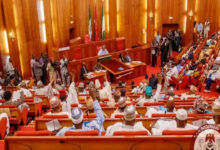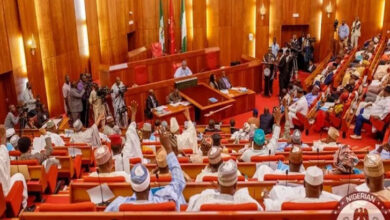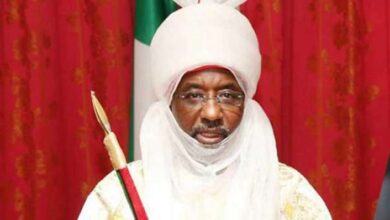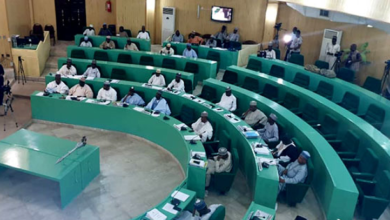If federalism is the answer, what is the question?

Director General, Nigerian Institute of International Affairs (NIIA), Prof. Eghosa E. Osaghae, examines arguments for true federalism as solution to myriads of problems confronting Nigeria and counsels its proponents to conceptualise federalism that will recognise peculiarities of the Nigerian State.
This intriguing subject reminds me of the complexities and imponderables of federalism discourses and debates in Nigeria that once led Professor John Ayoade, my teacher and senior colleague at the University of Ibadan that long ago in 1982, to declare that federalism was the worship of an unknown god, the worship, if you like, of a solution that even its advocates did not really know or understand. In this case, however, it helps that federalism is thought of as a solution, that is, an answer.
But how do you know or affirm the answer before asking what is the question? Imagine the proposition if A) B where B is the answer to A. It is very unlikely that B can be true or valid where A is unknown, except it can be argued or proven that B is a true answer to all possible questions involving A. Can federalism, whose success or effectiveness cannot be guaranteed, be such an omnibus and invariant answer, a magic wand of sorts? May be, or better still, for the purpose of this short piece, we have to assume that it is.
Perhaps one logical way to make sense of the answer-before-question puzzle is to borrow a leaf from the fabled tortoise’s know-all bag of wisdom that I am sure will recommend working from the answer to the question, which can then be operationalised as the problem. So, to clear the conundrum of worshipping an unknown god, which the positive affirmation of federalism being the answer suggests, we may simply say that federalism provides a solution to problem(s) of governing certain kinds of societies, managing diversity, and so on. But how so, what kinds of problems, and what kinds of federalism? Is federalism a means to an end or an end in itself? Does federalism always work? With a focus on Nigeria, these are the kinds of questions that I tackle in this keynote and review of The Guardian’s Federalist Papers.
I should point out that for us at the NIIA these questions are recurrent and not new. In 1978, the Institute convened the most notable international conference on federalism on African soil that led to the publication of Readings on Federalism (1979), one of the most authoritative books on comparative federalism to date. The fact that many of the issues raised in the Federalist Papers and in this lecture were raised that long ago, and would continue to be raised, points to one critical element of federalism: it is a dynamic system whose character – and problems – cannot be resolved once and for all. The argument of this keynote is that federalism provides many answers critical to the management of diversity in a country like Nigeria, but those answers entail more than focus on the federal government and its concomitant legal-constitutional approach alone can resolve.
Somewhat fortuitously, my last three major works on federalism have prepared me well for the task at hand. In A State of Our Own, which was the Inaugural Lecture I delivered as the Emeka Anyaoku Chair of Commonwealth Studies at the University of London in 2014, I argued that federalism offered the most appropriate device for rebuilding the state in Africa as an organically owned and autochthonous entity rather than the colonially imposed entity that it is.
This was the demand of the state-dissolving second independence struggles that swept through many parts of Africa from the late 1980s to resolve another conundrum of the contemporary state in Africa that Pierre Englebert (1997) has argued, is neither state nor African. The state of our own thesis was further explored in Federal Solutions to State Failure in Africa (2020), in which I argued that contrary to the suggestion in the literature that state failure is endemic to Africa, what has failed and is failing is the colonial state and its migrant and imported social structure, an inevitable consequence of the Curse of the Nation-State (Davidson, 1992), Curse of Berlin (Adebajo, 2010) and the damnosa hereditas of colonialism (Kirk-Greene, 1982).
Federalism is crucial to the reconstruction of what in essence would be the post-colonial state in its true sense, knowing that colonial acts of creation were the stuff of which nostrums, experiments and artificiality are made. If the inherited states, the boundaries, groups, and economies claimed for them are to survive and become more meaningful as self-determined states, the acts of recreation – and decolonisation – require renegotiation and bargaining that only federal solutions offer. Nigeria is also in the throes of state reconstruction, propelled as the process is, by separatist, secessionist, terrorist, restructuring, and true federalism agitations. The advantage Nigeria has is that it is already a federal system, and has over the years built a federal political culture of accommodation, bargaining and resilience.
But it is in my third work, What Man has Joined Together, another Inaugural Lecture at the University of Ibadan in 2019 that I come closer to the subject of this lecture. I interrogate federalism as a deliberate but intricate arrangement designed and adopted to resolve problems of statehood, governance and development in situations of diversity that require delicate balancing between demands of common government and centralisation and demands for self-government and non-centralisation. In contrast to unitary systems, which in some sense represent the ‘natural’ tendency of centralised statehood, federalism is purposive, and negotiated, bargained, constructed, and continuously fine-tuned to serve specific ends and provide specific answers to specific questions at various points in time. This is the deliberate and reality-creating context in which we can speak of federalism as an answer or solution.
The notion of federalism being a congeries of solutions has always been central to its conception, though we have to admit that the prudery of legal-constitutional perspectives has continuously overshadowed this more enduring character of federalism. It has done so by narrowing the essence of federalism to the mechanics of thoroughgoing federal government (government run according to a federal constitution) and debates on how true or pure federalism is. It was on such grounds that Kenneth Wheare (1967) led other legal-constitutional adherents to argue that the federal systems of the former USSR, Nigeria, India and Canada were either quasi-federal or not federal at all because their constitutions allowed for secession, or emergency powers under which the central government could assume direct control of component units where law and order had broken down, or because they were run by authoritarian one-party and military regimes.
Based largely on U.S. federal practice, Wheare argued that compliance with so-called core federal principles (some of which were institutions and practices adopted to make federalism work in the U.S.) – non-subordination of constituent units to central authority, substantial and not trivial sharing of power between the central and constituent governments, democracy/two-multiparty system, independence of judiciary/judicial review, fiscal autonomy of constituent units, etc. – is the essence of federalism. From the debates on true federalism and restructuring which revolve around the constitution, fiscal autonomy of states, devolution of powers, state police, etc., the romanticisation of the 1963 constitutional order by many contributors, and the domination of public debates by constitution-quoting lawyers, it is obvious that federal discourses in Nigeria are prevalently legal-constitutional.
While the importance of the defining elements of ideal-type federalism as a constitutional system cannot be denied – at least to differentiate federal from non-federal systems especially now that boundaries of governmental systems have increasingly blurred – it does federalism a lot of disservice to reduce its essence to strictly constitutional mechanics. States adopt federal formulas not because they want to conform to textbook or constitutional and theoretical ideals and prescriptions, but to solve specific problems in ways that suit their circumstances. In any case, as many students of federalism know, you can have the truest federal constitution and still deviate from federalism in practice or in fact have a failed system because the constitution is not operated in isolation of other contextual factors. Today, constitutional purists in Nigeria regard the 1963 Republican constitution as the ideal reference point for true federalism, but the constitutional order was not the perfect order that many claim it was. Regional Commissioners of Police were answerable to federal authorities through the Inspector-General, Native Authority police were notorious for primitive repression, the structure of fiscal federalism was changing in favour of the central government, and the regions were in danger of losing autonomy as the invocation of emergency powers by the federal government in the Western region showed. But the greatest problem federalism faced in the First Republic was that if failed the test of Mill’s “law of federal stability”. According to JS Mill, in a federal system, no one or few units should be larger than the other units put together or be in a position to dominate them. Where that is the case, the federation cannot last long and will most likely be in perennial crisis.
It could not have been surprising therefore that even with the best constitution, the pre-1966 federal system did not work well. The military tried to address this problem by creating more states and localities, but domination or the fear/perception of domination by states, regions and groups at the national and subnational levels was and remains a potent threat to federal stability.
To ward off such dangers, federal systems find it expedient to introduce additional instrumentalities and innovative policies to enhance the efficacy of the federal solution. Marshal Tito’s Yugoslavia made local government a third tier of the country’s federal system, as Nigeria and to some extent South Africa did, while the old Soviet Union and Ethiopia adopted the secession clause as a pragmatic device for keeping their federations together.
The introduction of enhancers and strengtheners raises the whole question of means and ends. To the extent that it is purposive and adopted to advance goals of political and economic integration and development, common defence, diversity management, federalism – especially as federal government – can be both ends and means. But the same cannot be said for corrective, redressive, balancing, and equity-seeking instrumentalities that are expedient, pragmatic and heuristic.
The interim constitution of South Africa contained a number of sunset clauses that were introduced to correct the structural imbalances of the apartheid past, but were designed to be means to equitable ends, rather than ends in themselves. Nigeria has instrumentalities like the quota system, federal character principle, zoning, and so on, which were designed to meet the equity and balancing imperatives of the nation-centred trajectory of military federalism, but seem now to have become ends in themselves, strengthening what Peter Ekeh (1989) regarded as the counterproductive culture of entitlement in the federation.
The implication of all that has been said so far should be clear: federalism does not offer a one-size-fits-all solution; it is a highly contextual variable because what works in one federal system may not work in another – every country has to work out the federal arrangement that works for it. It is on this ground that Livingston posited long ago that the essence of federalism is to be found in the nature of society and the kinds of problems it was intended to serve rather than the constitution. Depending on the circumstances and problems to be resolved, federalism can be operated in ways that tend towards unitary or confederal practices – which some may regard as unfederal – without the system losing the status of being federal.
Thus, military federalism, the supposed contradiction in terms and misnomer that crippled federalism in Nigeria as most commentators argue, did not mean the end of federalism in the country – it only represented one of the more extremely centralised varieties of federalism, just as the pre-military region-centred trajectory represented a highly non-centralised variety. For the military, the collapse of the First Republic and the subsequent civil war made it imperative for the country to adopt more integrative instrumentalities to replace the divisive proclivities of the regions that at a point were described as autonomous states of a primitive international system.
Yes, the desecration of core federal principles and practices was inimical, yet it is ironical that some of the acclaimed innovative instrumentalities that students of comparative federalism regarded as major contributions of Nigeria’s federal practice to strengthening federal solutions in diversity management such as the incorporation of local government into the IGR grid, creation of more states and local government areas, flexible fiscal federalism, and power sharing formulas like federal character, zoning and power rotation, were introduced under the military. To the extent that the instrumentalities suited the circumstances and imperatives of hyper-centralisation at the time, they made for true federalism and were the answers to the questions of that period. Today, the circumstances and imperatives have changed and pose new questions that clearly demand new answers and instrumentalities of the non-centralised trajectory of old in which constituent units had more autonomy.
Therefore, depending on the constellation of forces and demands of political society, the federal pendulum can swing from one end to the other as the system is adjusted or recalibrated to meet desired objectives. In other words, federal government – and federal solution at large – is not a fixed, static or never changing system that solves problems or provides answers once and for all. As the nature of society and political demands changes, Livingston has argued, federal instrumentalities are expected to change. It is when the instrumentalities fail to change that the effectiveness and utility of federal solutions and answers are called to question.
These dynamics and paradigmatic shifts are integral to federalism, but strictly legal-constitutional perspectives are too rigid and restrictive to give them full vent, both in theory and in practice. When students of federalism and conflict managers attribute such magical powers as ‘cure for micronationalism’ (secession, minority problems, separatist agitations), ‘accommodation of differences’, ‘management of diversity’, ‘device for political and economic integration and union’ (that extends to international and regional organisations) to federalism, they certainly have the broad spectrum of federal solutions that entails a lot more than federal government in mind.
As I have argued elsewhere, federal government represents the most elaborate and thoroughgoing variety of the federal solution, but there are other varieties of core federal principles of power sharing, decentralisation, subsidiarity, and local autonomy that do not require full-fledged federal constitutions. In the circumstances of fragile states and states transitioning to post-colonial self-determined statehood, more creative, adaptive, and innovative approaches to federalism are necessary, even where thoroughgoing federal governments are in operation as is the case in Nigeria.
A strictly legal-constitutional approach, if not properly handled, can become counterproductive. Nigeria needs new federal instrumentalities that will give the constituent units more powers and make them productive centres and thereby reduce the tensions, fears and dangers of an overcentralised arrangement where the health of the federation, its wealth, security, and progress depends only on the viability of the federal government. We need to undo the desecration of subnational viability by the Irikefe Panel in its argument that viability, the principle which requires states to have autonomous fiscal, administrative and productive capacities to qualify to be constituent units was no longer necessary because the central government, having taken over control of the country’s power and resources, was the master government to which everyone should look up to. The master government has run its course as demanded by the nation-centred trajectory of military federalism, but the things have changed, and the demands now are for a state-centred trajectory. Federalism has the answer because it is a responsive system of government, but the answer does not lie only in the constitution.
We need to be reminded that the negotiation and bargaining that produces federalism in aggregative – or coming together – federations where the constituent units were formerly autonomous or independent is different from that of disaggregative – or holding together – federations where the central government is mostly responsible for creating the constituent units and continues to claim proprietary rights over them.
This is possible because, as is the case in Nigeria, the constituent units generally lack the organic character of autonomous entities and, like the central state, are still incomplete works of becoming. But federalism offers them the opportunity to be different, to develop and fully become as they choose. The more they are able to do so, the greater the likelihood that federalism will work better. That is one of the surer ways of working from the answer to the question. The magic of federalism lies in the determination to make it work.
Prof Osaghae delivered this paper at the 40th anniversary lecture of The Guardian and public presentation of The Guardian Federalist Papers titled: Federalism Is The Answer.







